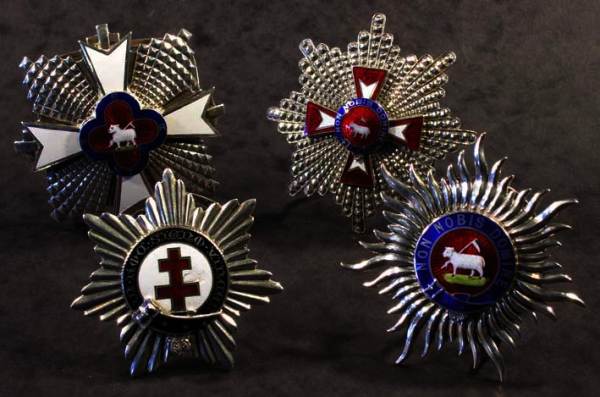Home
/
M0162
Jewellery/Accessories: M0162
Title
Four silver orders worn by Fred Terry
Technique
Mixed media
Subject
Character
Henry de Bourbon : Henry of Navarre
Other materials
Stirling silver with enamel:6.5x7.2; 8.2x8.4; 8.5 x 8.5; 8.6x8.5
Inscription/signature
Various hallmarks; "In hoc signo vinces", "FERT", "Non nobis domine" (inscribed on the enamel badges)
Provenance
Fred Terry, then by descent to Mrs Julia Nightingale, by whom presented to the Garrick Club, 2006
Other number
Gift 1059 [a substantial collection of material chiefly relating to Fred Terry and his circle]
William Devereux's play was first performed at the New Theatre in 1909, with Fred Terry taking the lead as Henry of Navarre. The setting for the play is the marriage of the Huguenot Henry to the Catholic Marguerite de Valois, and the ensuing St. Bartholomew's Day massacre. Within this context the orders are symbols of faith and statehood relating to French Catholicism and the historical political positioning of the time. This can be seen in the three Agnus Dei or paschal lambs, together with the cross of Lorainne, and the three inscriptions: "In hoc signo vinces" translates as "In this sign thou shalt conquer"; "FERT" is the abbreviation for " Fides Est Regni Tutela" or "Faith is the protection of the kingdom"; "Non nobis domine" translates as "Not to us Lord".
In the final act, at the height of the massacre Marguerite secretly pins the orders onto Henry's robes and under this "disguise" of cathlicism he is thus protected.
The melodrama is of course extremely fanciful. Whilst it has Henry and Marguerite deeply in love with each other, the truth was that they despised each other to the point that Henry is recorded as being unable to remain at his own wedding ceremony. He would however later convert to Catholicism and become King Henry IV.
In the final act, at the height of the massacre Marguerite secretly pins the orders onto Henry's robes and under this "disguise" of cathlicism he is thus protected.
The melodrama is of course extremely fanciful. Whilst it has Henry and Marguerite deeply in love with each other, the truth was that they despised each other to the point that Henry is recorded as being unable to remain at his own wedding ceremony. He would however later convert to Catholicism and become King Henry IV.

